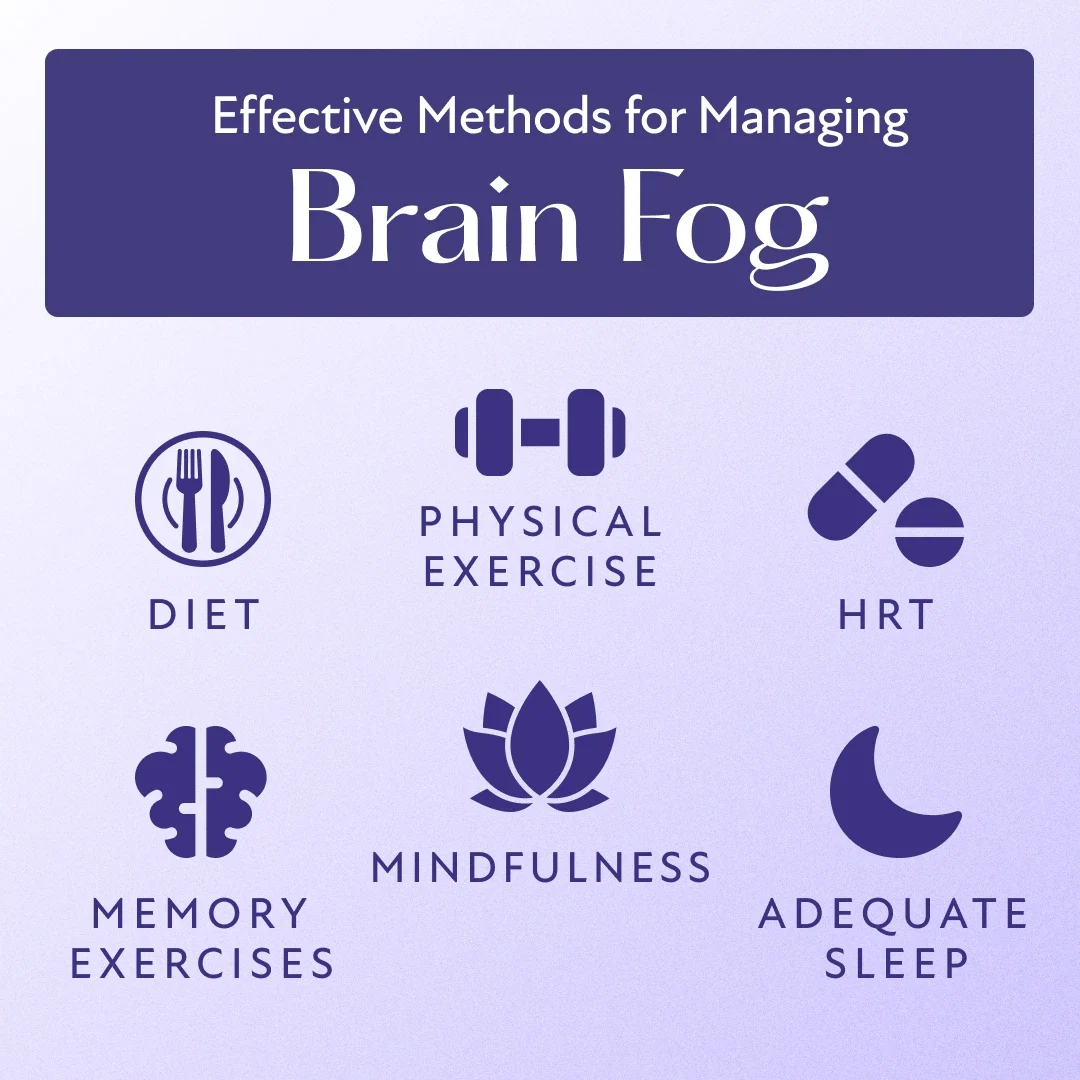Many women in the menopausal transition experience moments like entering a room and forgetting why or struggling to find the right word during a conversation. These symptoms can often be mistaken for signs of dementia. However, when these experiences coincide with hormonal fluctuations, they are more likely to be “menopause brain” or “brain fog,” which are common during this phase.1
These menopause symptoms can be effectively managed through a combination of medication and lifestyle changes. For instance, hormone replacement therapy (HRT), a balanced diet, regular physical activity, and stress-reduction methods can offer significant relief. By addressing these symptoms proactively, women can regain confidence and navigate this transition with greater ease. If there is any uncertainty about the symptoms, consulting a doctor is advisable to ensure proper guidance and support.
What is menopause brain fog?
Brain fog is a term used to describe women's issues with memory, concentration, and focus during the menopausal transition. Signs can include forgetfulness, trouble concentrating, difficulty thinking clearly or solving problems, and confusion.2
What causes brain fog during menopause?
Researchers have found that a combination of various factors, including hormonal changes, lack of sleep, stress, and lifestyle habits, contribute to brain fog during menopause.
Hormones
Two key hormones, estrogen and testosterone, which are produced in the ovaries, significantly influence cognition and memory in women.
Estrogen is vital for brain health. It stimulates the activity of nerve cells in the brain, promotes the growth of new cells, and aids in making new nerve cell connections. As estrogen levels drop during the menopause transition, the entire body, including the brain, experiences a state of deprivation. On a cellular level, estrogen drives brain cells to burn glucose, their primary fuel. Research indicates that overall brain energy levels decrease during menopause, which can lead to hot flashes, night sweats, anxiety, depression, brain fog, and other cognitive symptoms.1
Testosterone enhances nerve strength in the brain, contributing to mental clarity and overall energy levels. It also supports the blood vessels that supply blood to the brain, which is crucial for maintaining memory function.1
Sleep Disturbances
Sleep disturbances are a frequent challenge during menopause. Hot flashes, mood swings, and other symptoms can severely disrupt sleep patterns, leading to a range of cognitive issues. Lack of sleep intensifies cognitive problems, resulting in foggy thinking and memory lapses. Researchers have found that sleep deprivation disrupts brain cells' ability to communicate with each other, causing temporary mental lapses that impair memory and visual perception.1
Stress
Women going through menopause often face significant stress from various aspects of life. Balancing work, finances, raising a family, or caring for aging parents can create a high-stress environment that eventually impacts concentration.3

What are effective treatments for brain fog?
Experts recommend the following strategies to support brain health and manage brain fog:
Diet
It's advisable to avoid a diet rich in low-density lipoprotein (LDL) cholesterol and saturated fats, such as fried foods, processed snacks, and fatty meats, as these can harm the heart and brain. Adopting the Mediterranean diet is a good option, as it’s rich in omega-3 fatty acids and other unsaturated fats that are known to support brain health. This diet includes fresh fruits and vegetables, whole grains, fish, beans, nuts, and olive oil.4
Exercise
Exercise benefits everyone, particularly women going through menopause. It can improve mood, sleep, and hormone regulation, thereby enhancing memory and cognition. Experts recommend 150 minutes of moderate-intensity exercise each week. Engaging in activities like walking, jogging, cycling, and water aerobics can make this goal enjoyable and achievable.5
Adding strength training to the routine is equally beneficial. It helps build and maintain muscle mass, which is crucial, as many women face muscle loss during this life phase. Aiming for at least two weekly strengt
h training sessions is optimal, including exercise with free weights or weight machines.
Memory Exercises
Working out isn't just for the body. Brain training activities, such as crossword puzzles, sudoku, reading, or engaging discussions, have been shown to help keep cognition sharp. Playing mentally stimulating games or learning a new skill can improve attention, conce
ntration, memory, and motor speed.6
Adequate Sleep
Poor sleep quality can exacerbate brain fog. Sleep disturbances are a significant concern that affects approximately 35%–60% of menopausal women, so achieving restful sleep is essential.7
The following measures can help support better sleep:8
Avoiding eating large meals and spicy or acidic foods before bedtime, as they can trigger hot flashes
Steering clear of stimulants like caffeine and nicotine in the evening, and being mindful of alcohol consumption, as it can disrupt sleep
Opting for lightweight, breathable clothing for bedtime and avoi
ding using heavy blankets
Lowering the thermostat or using a fan to help maintain a cool and comfortable sleeping environment
Mindfulness
Supporting mental health during menopause is essential. Engaging in stress-relieving activities like long walks, meditation, and creative pursuits can be highly beneficial. Meditation, in particular, is good for anyone seeking a more focused mind. Multiple studies have shown that even 10–20 minutes of meditation daily can improve focus and cognitive performance.9
Hormone Replacement Therapy (HRT)
Various studies have shown that HRT may enhance well-being and boost energy, concentration, and memory. Estrogen fluctuations during menopause can result in a foggy brain. HRT helps manage this imbalance for improved memory and cognition.1 Women with a uterus will likely be prescribed progesterone alongside estrogen to prevent the thickening of the uterine lining, which can cause endometrial hyperplasia.
HRT can also help alleviate both physical and psychological symptoms that can interfere with brain function, such as nighttime hot flashes that disrupt sleep. It can also reduce the risk of osteoporosis and heart diseases, which are common comorbidities in menopausal women.
Experiencing menopausal brain fog? Discover if HRT is right for you.
If you’ve entered the menopause transition and are struggling with brain fog, you don’t have to suffer in silence. Take our brief menopause quiz to see if you’re an eligible candidate for HRT. Get started with Winona to take the first step toward feeling better.